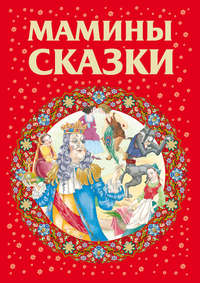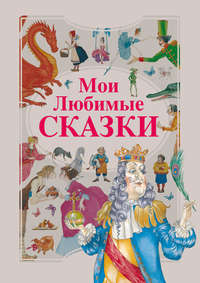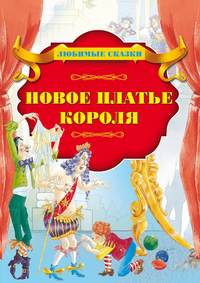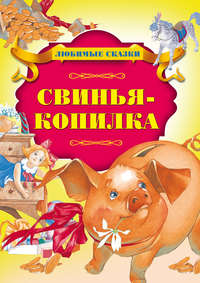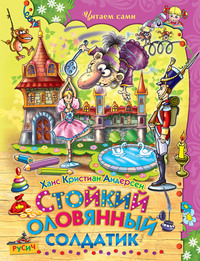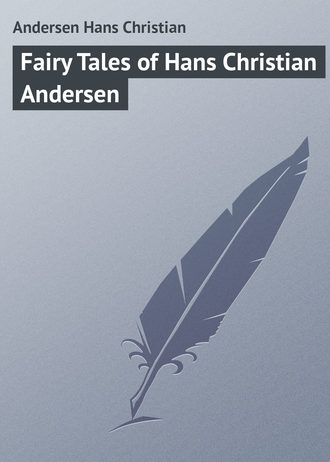 полная версия
полная версияFairy Tales of Hans Christian Andersen
"You are given away," said the little boy; "you must stay. Don't you see that?" Then the old man came in, with a box containing many curious things to show him. Rouge-pots, scent-boxes, and old cards, so large and so richly gilded, that none are ever seen like them in these days. And there were smaller boxes to look at, and the piano was opened, and inside the lid were painted landscapes. But when the old man played, the piano sounded quite out of tune. Then he looked at the picture he had bought at the broker's, and his eyes sparkled brightly as he nodded at it, and said, "Ah, she could sing that tune."
"I will go to the wars! I will go to the wars!" cried the tin soldier as loud as he could, and threw himself down on the floor. Where could he have fallen? The old man searched, and the little boy searched, but he was gone, and could not be found. "I shall find him again," said the old man, but he did not find him. The boards of the floor were open and full of holes. The tin soldier had fallen through a crack between the boards, and lay there now in an open grave. The day went by, and the little boy returned home; the week passed, and many more weeks. It was winter, and the windows were quite frozen, so the little boy was obliged to breathe on the panes, and rub a hole to peep through at the old house. Snow drifts were lying in all the scrolls and on the inscriptions, and the steps were covered with snow as if no one were at home. And indeed nobody was home, for the old man was dead. In the evening, a hearse stopped at the door, and the old man in his coffin was placed in it. He was to be taken to the country to be buried there in his own grave; so they carried him away; no one followed him, for all his friends were dead; and the little boy kissed his hand to the coffin as the hearse moved away with it. A few days after, there was an auction at the old house, and from his window the little boy saw the people carrying away the pictures of old knights and ladies, the flower-pots with the long ears, the old chairs, and the cup-boards. Some were taken one way, some another. Her portrait, which had been bought at the picture dealer's, went back again to his shop, and there it remained, for no one seemed to know her, or to care for the old picture. In the spring; they began to pull the house itself down; people called it complete rubbish. From the street could be seen the room in which the walls were covered with leather, ragged and torn, and the green in the balcony hung straggling over the beams; they pulled it down quickly, for it looked ready to fall, and at last it was cleared away altogether. "What a good riddance," said the neighbors' houses. Very shortly, a fine new house was built farther back from the road; it had lofty windows and smooth walls, but in front, on the spot where the old house really stood, a little garden was planted, and wild vines grew up over the neighboring walls; in front of the garden were large iron railings and a great gate, which looked very stately. People used to stop and peep through the railings. The sparrows assembled in dozens upon the wild vines, and chattered all together as loud as they could, but not about the old house; none of them could remember it, for many years had passed by, so many indeed, that the little boy was now a man, and a really good man too, and his parents were very proud of him. He was just married, and had come, with his young wife, to reside in the new house with the garden in front of it, and now he stood there by her side while she planted a field flower that she thought very pretty. She was planting it herself with her little hands, and pressing down the earth with her fingers. "Oh dear, what was that?" she exclaimed, as something pricked her. Out of the soft earth something was sticking up. It was – only think! – it was really the tin soldier, the very same which had been lost up in the old man's room, and had been hidden among old wood and rubbish for a long time, till it sunk into the earth, where it must have been for many years. And the young wife wiped the soldier, first with a green leaf, and then with her fine pocket-handkerchief, that smelt of such beautiful perfume. And the tin soldier felt as if he was recovering from a fainting fit. "Let me see him," said the young man, and then he smiled and shook his head, and said, "It can scarcely be the same, but it reminds me of something that happened to one of my tin soldiers when I was a little boy." And then he told his wife about the old house and the old man, and of the tin soldier which he had sent across, because he thought the old man was lonely; and he related the story so clearly that tears came into the eyes of the young wife for the old house and the old man. "It is very likely that this is really the same soldier," said she, "and I will take care of him, and always remember what you have told me; but some day you must show me the old man's grave."
"I don't know where it is," he replied; "no one knows. All his friends are dead; no one took care of him, and I was only a little boy."
"Oh, how dreadfully lonely he must have been," said she.
"Yes, terribly lonely," cried the tin soldier; "still it is delightful not to be forgotten."
"Delightful indeed," cried a voice quite near to them; no one but the tin soldier saw that it came from a rag of the leather which hung in tatters; it had lost all its gilding, and looked like wet earth, but it had an opinion, and it spoke it thus: —
"Gilding will fade in damp weather,To endure, there is nothing like leather."But the tin soldier did not believe any such thing.
WHAT THE OLD MAN DOES IS ALWAYS RIGHT
I will tell you a story that was told me when I was a little boy. Every time I thought of this story, it seemed to me more and more charming; for it is with stories as it is with many people – they become better as they grow older.
I have no doubt that you have been in the country, and seen a very old farmhouse, with a thatched roof, and mosses and small plants growing wild upon it. There is a stork's nest on the ridge of the gable, for we cannot do without the stork. The walls of the house are sloping, and the windows are low, and only one of the latter is made to open. The baking-oven sticks out of the wall like a great knob. An elder-tree hangs over the palings; and beneath its branches, at the foot of the paling, is a pool of water, in which a few ducks are disporting themselves. There is a yard-dog too, who barks at all corners. Just such a farmhouse as this stood in a country lane; and in it dwelt an old couple, a peasant and his wife. Small as their possessions were, they had one article they could not do without, and that was a horse, which contrived to live upon the grass which it found by the side of the high road. The old peasant rode into the town upon this horse, and his neighbors often borrowed it of him, and paid for the loan of it by rendering some service to the old couple. After a time they thought it would be as well to sell the horse, or exchange it for something which might be more useful to them. But what might this something be?
"You'll know best, old man," said the wife. "It is fair-day to-day; so ride into town, and get rid of the horse for money, or make a good exchange; whichever you do will be right to me, so ride to the fair."
And she fastened his neckerchief for him; for she could do that better than he could, and she could also tie it very prettily in a double bow. She also smoothed his hat round and round with the palm of her hand, and gave him a kiss. Then he rode away upon the horse that was to be sold or bartered for something else. Yes, the old man knew what he was about. The sun shone with great heat, and not a cloud was to be seen in the sky. The road was very dusty; for a number of people, all going to the fair, were driving, riding, or walking upon it. There was no shelter anywhere from the hot sunshine. Among the rest a man came trudging along, and driving a cow to the fair. The cow was as beautiful a creature as any cow could be.
"She gives good milk, I am certain," said the peasant to himself. "That would be a very good exchange: the cow for the horse. Hallo there! you with the cow," he said. "I tell you what; I dare say a horse is of more value than a cow; but I don't care for that, – a cow will be more useful to me; so, if you like, we'll exchange."
"To be sure I will," said the man.
Accordingly the exchange was made; and as the matter was settled, the peasant might have turned back; for he had done the business he came to do. But, having made up his mind to go to the fair, he determined to do so, if only to have a look at it; so on he went to the town with his cow. Leading the animal, he strode on sturdily, and, after a short time, overtook a man who was driving a sheep. It was a good fat sheep, with a fine fleece on its back.
"I should like to have that fellow," said the peasant to himself. "There is plenty of grass for him by our palings, and in the winter we could keep him in the room with us. Perhaps it would be more profitable to have a sheep than a cow. Shall I exchange?" The man with the sheep was quite ready, and the bargain was quickly made. And then our peasant continued his way on the high-road with his sheep. Soon after this, he overtook another man, who had come into the road from a field, and was carrying a large goose under his arm.
"What a heavy creature you have there!" said the peasant; "it has plenty of feathers and plenty of fat, and would look well tied to a string, or paddling in the water at our place. That would be very useful to my old woman; she could make all sorts of profits out of it. How often she has said, 'If now we only had a goose!' Now here is an opportunity, and, if possible, I will get it for her. Shall we exchange? I will give you my sheep for your goose, and thanks into the bargain."
The other had not the least objection, and accordingly the exchange was made, and our peasant became possessor of the goose. By this time he had arrived very near the town. The crowd on the high road had been gradually increasing, and there was quite a rush of men and cattle. The cattle walked on the path and by the palings, and at the turnpike-gate they even walked into the toll-keeper's potato-field, where one fowl was strutting about with a string tied to its leg, for fear it should take fright at the crowd, and run away and get lost. The tail-feathers of the fowl were very short, and it winked with both its eyes, and looked very cunning, as it said "Cluck, cluck." What were the thoughts of the fowl as it said this I cannot tell you; but directly our good man saw it, he thought, "Why that's the finest fowl I ever saw in my life; it's finer than our parson's brood hen, upon my word. I should like to have that fowl. Fowls can always pick up a few grains that lie about, and almost keep themselves. I think it would be a good exchange if I could get it for my goose. Shall we exchange?" he asked the toll-keeper.
"Exchange," repeated the man; "well, it would not be a bad thing."
And so they made an exchange, – the toll-keeper at the turnpike-gate kept the goose, and the peasant carried off the fowl. Now he had really done a great deal of business on his way to the fair, and he was hot and tired. He wanted something to eat, and a glass of ale to refresh himself; so he turned his steps to an inn. He was just about to enter when the ostler came out, and they met at the door. The ostler was carrying a sack. "What have you in that sack?" asked the peasant.
"Rotten apples," answered the ostler; "a whole sackful of them. They will do to feed the pigs with."
"Why that will be terrible waste," he replied; "I should like to take them home to my old woman. Last year the old apple-tree by the grass-plot only bore one apple, and we kept it in the cupboard till it was quite withered and rotten. It was always property, my old woman said; and here she would see a great deal of property – a whole sackful; I should like to show them to her."
"What will you give me for the sackful?" asked the ostler.
"What will I give? Well, I will give you my fowl in exchange."
So he gave up the fowl, and received the apples, which he carried into the inn parlor. He leaned the sack carefully against the stove, and then went to the table. But the stove was hot, and he had not thought of that. Many guests were present – horse dealers, cattle drovers, and two Englishmen. The Englishmen were so rich that their pockets quite bulged out and seemed ready to burst; and they could bet too, as you shall hear. "Hiss-s-s, hiss-s-s." What could that be by the stove? The apples were beginning to roast. "What is that?" asked one.
"Why, do you know" – said our peasant. And then he told them the whole story of the horse, which he had exchanged for a cow, and all the rest of it, down to the apples.
"Well, your old woman will give it you well when you get home," said one of the Englishmen. "Won't there be a noise?"
"What! Give me what?" said the peasant. "Why, she will kiss me, and say, 'what the old man does is always right.'"
"Let us lay a wager on it," said the Englishmen. "We'll wager you a ton of coined gold, a hundred pounds to the hundred-weight."
"No; a bushel will be enough," replied the peasant. "I can only set a bushel of apples against it, and I'll throw myself and my old woman into the bargain; that will pile up the measure, I fancy."
"Done! taken!" and so the bet was made.
Then the landlord's coach came to the door, and the two Englishmen and the peasant got in, and away they drove, and soon arrived and stopped at the peasant's hut. "Good evening, old woman." "Good evening, old man." "I've made the exchange."
"Ah, well, you understand what you're about," said the woman. Then she embraced him, and paid no attention to the strangers, nor did she notice the sack.
"I got a cow in exchange for the horse."
"Thank Heaven," said she. "Now we shall have plenty of milk, and butter, and cheese on the table. That was a capital exchange."
"Yes, but I changed the cow for a sheep."
"Ah, better still!" cried the wife. "You always think of everything; we have just enough pasture for a sheep. Ewe's milk and cheese, woollen jackets and stockings! The cow could not give all these, and her hair only falls off. How you think of everything!"
"But I changed away the sheep for a goose."
"Then we shall have roast goose to eat this year. You dear old man, you are always thinking of something to please me. This is delightful. We can let the goose walk about with a string tied to her leg, so she will be fatter still before we roast her."
"But I gave away the goose for a fowl."
"A fowl! Well, that was a good exchange," replied the woman. "The fowl will lay eggs and hatch them, and we shall have chickens; we shall soon have a poultry-yard. Oh, this is just what I was wishing for."
"Yes, but I exchanged the fowl for a sack of shrivelled apples."
"What! I really must give you a kiss for that!" exclaimed the wife. "My dear, good husband, now I'll tell you something. Do you know, almost as soon as you left me this morning, I began to think of what I could give you nice for supper this evening, and then I thought of fried eggs and bacon, with sweet herbs; I had eggs and bacon, but I wanted the herbs; so I went over to the schoolmaster's: I knew they had plenty of herbs, but the schoolmistress is very mean, although she can smile so sweetly. I begged her to lend me a handful of herbs. 'Lend!' she exclaimed, 'I have nothing to lend; nothing at all grows in our garden, not even a shrivelled apple; I could not even lend you a shrivelled apple, my dear woman. But now I can lend her ten, or a whole sackful, which I'm very glad of; it makes me laugh to think about it;" and then she gave him a hearty kiss.
"Well, I like all this," said both the Englishmen; "always going down the hill, and yet always merry; it's worth the money to see it." So they paid a hundred-weight of gold to the peasant, who, whatever he did, was not scolded but kissed.
Yes, it always pays best when the wife sees and maintains that her husband knows best, and whatever he does is right.
That is a story which I heard when I was a child; and now you have heard it too, and know that "What the old man does is always right."
THE OLD STREET LAMP
Did you ever hear the story of the old street lamp? It is not remarkably interesting, but for once in a way you may as well listen to it. It was a most respectable old lamp, which had seen many, many years of service, and now was to retire with a pension. It was this evening at its post for the last time, giving light to the street. His feelings were something like those of an old dancer at the theatre, who is dancing for the last time, and knows that on the morrow she will be in her garret, alone and forgotten. The lamp had very great anxiety about the next day, for he knew that he had to appear for the first time at the town hall, to be inspected by the mayor and the council, who were to decide if he were fit for further service or not; – whether the lamp was good enough to be used to light the inhabitants of one of the suburbs, or in the country, at some factory; and if not, it would be sent at once to an iron foundry, to be melted down. In this latter case it might be turned into anything, and he wondered very much whether he would then be able to remember that he had once been a street lamp, and it troubled him exceedingly. Whatever might happen, one thing seemed certain, that he would be separated from the watchman and his wife, whose family he looked upon as his own. The lamp had first been hung up on that very evening that the watchman, then a robust young man, had entered upon the duties of his office. Ah, well, it was a very long time since one became a lamp and the other a watchman. His wife had a little pride in those days; she seldom condescended to glance at the lamp, excepting when she passed by in the evening, never in the daytime. But in later years, when all these, – the watchman, the wife, and the lamp – had grown old, she had attended to it, cleaned it, and supplied it with oil. The old people were thoroughly honest, they had never cheated the lamp of a single drop of the oil provided for it.
This was the lamp's last night in the street, and to-morrow he must go to the town-hall, – two very dark things to think of. No wonder he did not burn brightly. Many other thoughts also passed through his mind. How many persons he had lighted on their way, and how much he had seen; as much, very likely, as the mayor and corporation themselves! None of these thoughts were uttered aloud, however; for he was a good, honorable old lamp, who would not willingly do harm to any one, especially to those in authority. As many things were recalled to his mind, the light would flash up with sudden brightness; he had, at such moments, a conviction that he would be remembered. "There was a handsome young man once," thought he; "it is certainly a long while ago, but I remember he had a little note, written on pink paper with a gold edge; the writing was elegant, evidently a lady's hand: twice he read it through, and kissed it, and then looked up at me, with eyes that said quite plainly, 'I am the happiest of men!' Only he and I know what was written on this his first letter from his lady-love. Ah, yes, and there was another pair of eyes that I remember, – it is really wonderful how the thoughts jump from one thing to another! A funeral passed through the street; a young and beautiful woman lay on a bier, decked with garlands of flowers, and attended by torches, which quite overpowered my light. All along the street stood the people from the houses, in crowds, ready to join the procession. But when the torches had passed from before me, and I could look round, I saw one person alone, standing, leaning against my post, and weeping. Never shall I forget the sorrowful eyes that looked up at me." These and similar reflections occupied the old street lamp, on this the last time that his light would shine. The sentry, when he is relieved from his post, knows at least who will succeed him, and may whisper a few words to him, but the lamp did not know his successor, or he could have given him a few hints respecting rain, or mist, and could have informed him how far the moon's rays would rest on the pavement, and from which side the wind generally blew, and so on.
On the bridge over the canal stood three persons, who wished to recommend themselves to the lamp, for they thought he could give the office to whomsoever he chose. The first was a herring's head, which could emit light in the darkness. He remarked that it would be a great saving of oil if they placed him on the lamp-post. Number two was a piece of rotten wood, which also shines in the dark. He considered himself descended from an old stem, once the pride of the forest. The third was a glow-worm, and how he found his way there the lamp could not imagine, yet there he was, and could really give light as well as the others. But the rotten wood and the herring's head declared most solemnly, by all they held sacred, that the glow-worm only gave light at certain times, and must not be allowed to compete with themselves. The old lamp assured them that not one of them could give sufficient light to fill the position of a street lamp; but they would believe nothing he said. And when they discovered that he had not the power of naming his successor, they said they were very glad to hear it, for the lamp was too old and worn-out to make a proper choice.
At this moment the wind came rushing round the corner of the street, and through the air-holes of the old lamp. "What is this I hear?" said he; "that you are going away to-morrow? Is this evening the last time we shall meet? Then I must present you with a farewell gift. I will blow into your brain, so that in future you shall not only be able to remember all that you have seen or heard in the past, but your light within shall be so bright, that you shall be able to understand all that is said or done in your presence."
"Oh, that is really a very, very great gift," said the old lamp; "I thank you most heartily. I only hope I shall not be melted down."
"That is not likely to happen yet," said the wind; "and I will also blow a memory into you, so that should you receive other similar presents your old age will pass very pleasantly."
"That is if I am not melted down," said the lamp. "But should I in that case still retain my memory?"
"Do be reasonable, old lamp," said the wind, puffing away.
At this moment the moon burst forth from the clouds. "What will you give the old lamp?" asked the wind.
"I can give nothing," she replied; "I am on the wane, and no lamps have ever given me light while I have frequently shone upon them." And with these words the moon hid herself again behind the clouds, that she might be saved from further importunities. Just then a drop fell upon the lamp, from the roof of the house, but the drop explained that he was a gift from those gray clouds, and perhaps the best of all gifts. "I shall penetrate you so thoroughly," he said, "that you will have the power of becoming rusty, and, if you wish it, to crumble into dust in one night."
But this seemed to the lamp a very shabby present, and the wind thought so too. "Does no one give any more? Will no one give any more?" shouted the breath of the wind, as loud as it could. Then a bright falling star came down, leaving a broad, luminous streak behind it.
"What was that?" cried the herring's head. "Did not a star fall? I really believe it went into the lamp. Certainly, when such high-born personages try for the office, we may as well say 'Good-night,' and go home."
And so they did, all three, while the old lamp threw a wonderfully strong light all around him.
"This is a glorious gift," said he; "the bright stars have always been a joy to me, and have always shone more brilliantly than I ever could shine, though I have tried with my whole might; and now they have noticed me, a poor old lamp, and have sent me a gift that will enable me to see clearly everything that I remember, as if it still stood before me, and to be seen by all those who love me. And herein lies the truest pleasure, for joy which we cannot share with others is only half enjoyed."
"That sentiment does you honor," said the wind; "but for this purpose wax lights will be necessary. If these are not lighted in you, your particular faculties will not benefit others in the least. The stars have not thought of this; they suppose that you and every other light must be a wax taper: but I must go down now." So he laid himself to rest.




